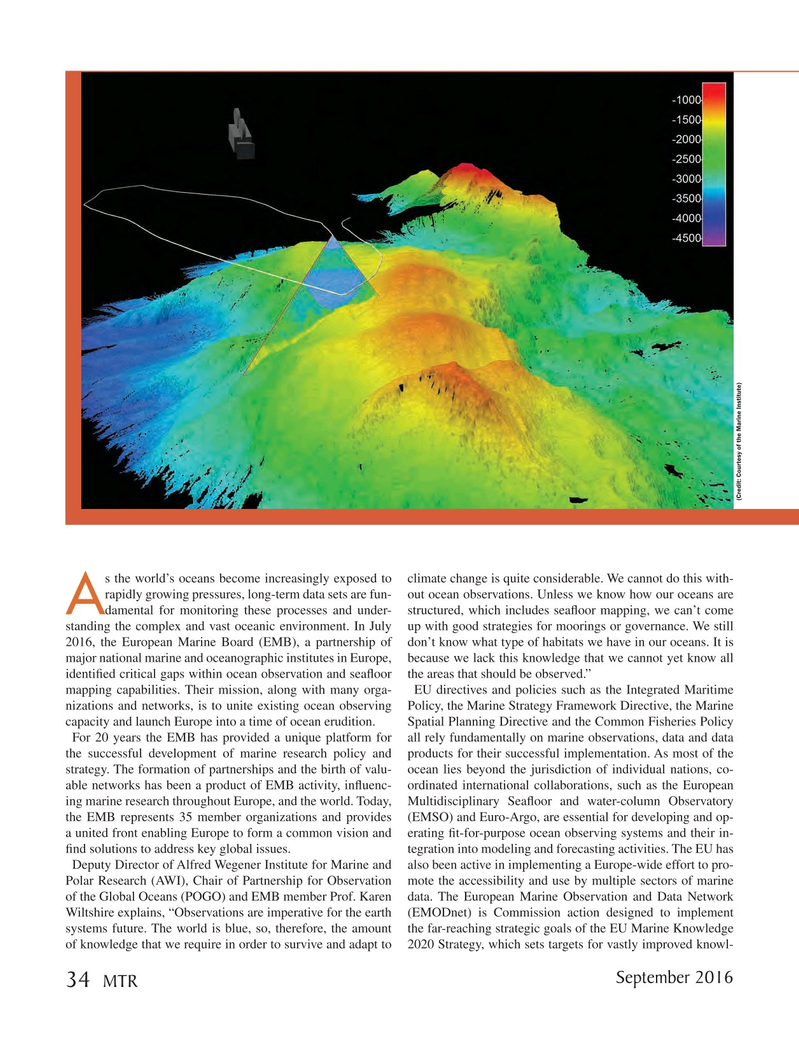
Page 34: of Marine Technology Magazine (September 2016)
Ocean Observation: Gliders, Buoys & Sub-Surface Networks
Read this page in Pdf, Flash or Html5 edition of September 2016 Marine Technology Magazine
(Credit: Courtesy of the Marine Institute) s the world’s oceans become increasingly exposed to climate change is quite considerable. We cannot do this with- rapidly growing pressures, long-term data sets are fun- out ocean observations. Unless we know how our oceans are
Adamental for monitoring these processes and under- structured, which includes sea? oor mapping, we can’t come standing the complex and vast oceanic environment. In July up with good strategies for moorings or governance. We still 2016, the European Marine Board (EMB), a partnership of don’t know what type of habitats we have in our oceans. It is major national marine and oceanographic institutes in Europe, because we lack this knowledge that we cannot yet know all identi? ed critical gaps within ocean observation and sea? oor the areas that should be observed.” mapping capabilities. Their mission, along with many orga- EU directives and policies such as the Integrated Maritime nizations and networks, is to unite existing ocean observing Policy, the Marine Strategy Framework Directive, the Marine capacity and launch Europe into a time of ocean erudition. Spatial Planning Directive and the Common Fisheries Policy
For 20 years the EMB has provided a unique platform for all rely fundamentally on marine observations, data and data the successful development of marine research policy and products for their successful implementation. As most of the strategy. The formation of partnerships and the birth of valu- ocean lies beyond the jurisdiction of individual nations, co- able networks has been a product of EMB activity, in? uenc- ordinated international collaborations, such as the European ing marine research throughout Europe, and the world. Today, Multidisciplinary Sea? oor and water-column Observatory the EMB represents 35 member organizations and provides (EMSO) and Euro-Argo, are essential for developing and op- a united front enabling Europe to form a common vision and erating ? t-for-purpose ocean observing systems and their in- ? nd solutions to address key global issues. tegration into modeling and forecasting activities. The EU has
Deputy Director of Alfred Wegener Institute for Marine and also been active in implementing a Europe-wide effort to pro-
Polar Research (AWI), Chair of Partnership for Observation mote the accessibility and use by multiple sectors of marine of the Global Oceans (POGO) and EMB member Prof. Karen data. The European Marine Observation and Data Network
Wiltshire explains, “Observations are imperative for the earth (EMODnet) is Commission action designed to implement systems future. The world is blue, so, therefore, the amount the far-reaching strategic goals of the EU Marine Knowledge of knowledge that we require in order to survive and adapt to 2020 Strategy, which sets targets for vastly improved knowl-
September 2016 34
MTR
MTR #7 (34-49).indd 34 8/24/2016 1:34:16 PM

 33
33

 35
35
